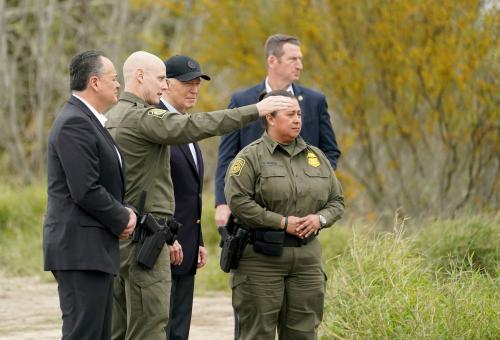Jack’s and Ashley’s analyses have covered the waterfront, so far as concerns the Kosovo precedent’s meaning (legal, moral and so forth) for a possible Syria intervention. Their remarks raised in my mind two further thoughts about the President’s ability to intervene in Syria without prior congressional approval.
The first has to do with the United States’ stance towards the United Nations, and that stance’s significance for presidential authority. As Jack noted, prior OLC opinions have concluded that one element supporting the President’s power to use force abroad pursuant to his own authority, and without prior congressional sign-off, is the vindication of certain so-called “national interests.” (And presumably, because the idea here is constraint, not every putative “interest” counts.) According to a line of executive branch thinking, one such interest is the effective functioning of the United Nations itself. For example, in an opinion on President Truman’s power “to repel attacks in Korea,” in 1950, the State Department argued that “[t]he continued existence of the United Nations as an effective international organization is a paramount United States interest” (emphasis mine). Later that language was cited by OLC, as partial justification for President George H.W. Bush’s use of force in Somalia, without initial congressional backing; and again more recently, as partial justification for President Obama’s not-initially-authorized-by-Congress campaign in Libya. In that case the Security Council had, among other things, imposed a no-fly zone over Libya and authorized the use of force to protect civilians. Having those in mind, OLC characterized as an “important national interest” “the longstanding U.S. commitment to maintaining the credibility of the United Nations Security Council and the effectiveness of its actions to promote international peace and security”—and found a legal basis for presidential action.
Of course there is no Security Council resolution in play yet, regarding Syria. And one isn’t likely in the offing, either, as most everyone expects that Russia or China, both permanent and veto-wielding members of the Council, would block any bid to deploy force against the Assad regime. (This would be consistent with past practice, as both have thwarted prior sanctions efforts by the Council on Syria.)
But that’s just the thing: if maintaining the credibility of the Council process qualifies as a “national interest,” even a paramount interest, for purposes of presidential power, then wouldn’t that interest arguably be undercut (or at least not advanced)—and force be harder to justify—if we know that Council approval for using force in Syria is off the table to begin with? The Council’s strict veto mechanism is, after all, as much a feature of the United Nations system as any other; indeed one rationale for conferring an absolute veto on the so-called “P5” was to make it that much harder for the U.N. to endorse the use of force. The question then arises: what about the Council’s credibility, in cases when a certain-though-still-hypothetical. or even an actual P5 veto precludes it from acting? Why should the Council’s credibility matter most, for purposes of the President’s power, when it acts affirmatively to support force, but not when it refuses to do so? (To be clear: I think any P5 vote that hinders the international community from stopping atrocity deserves unalloyed scorn, and I don’t mean to advance any claim about the desirability of action in Syria from a policy standpoint.)
Congress’s posture takes me to a second point, about the original domestic law justification for using force in Kosovo. That’s what matters most right now, judging by press accounts. And yet OLC never published an opinion about the President’s authority, domestic and international, to use force in Kosovo initially. (OLC’s 2011 Libya opinion cited the Kosovo campaign as a precedent, but did not specifically refer to any advice that, presumably, endorsed military action there in the first instance.) That’s odd, given the course of action now under discussion regarding Syria and the recent debates about Kosovo’s import. If the executive branch plans to elevate the Kosovo precedent’s status, so to speak, and rely on it more heavily here, then one could make the case that Congress or even the public ought to know more about any past OLC analyses on Kosovo—including any written opinion, if one exists, or at least some extensive summary of why the Executive branch in 1999 thought the Kosovo intervention itself was lawful.



Commentary
Op-edTwo Thoughts On Syria and Kosovo
August 27, 2013